Alumni News
Carbon Farming in California
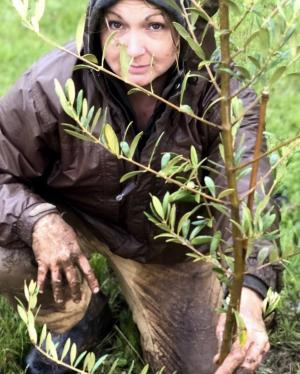 For years, Anwyn Hurxthal ’92 applied the curiosity and photography skills she fostered in Marlboro’s World Studies Program to her work with Oxfam, documenting social justice, disasters, and community development around the world. Now she is using the same skills to master regenerative ranching and farming in the San Francisco Bay Area of northern California.
For years, Anwyn Hurxthal ’92 applied the curiosity and photography skills she fostered in Marlboro’s World Studies Program to her work with Oxfam, documenting social justice, disasters, and community development around the world. Now she is using the same skills to master regenerative ranching and farming in the San Francisco Bay Area of northern California.
“Farming was never part of the plan,” says Anwyn Hurxthal, co-owner of Tule Ranch outside of Morgan Hill, California. “It was an American quarter horse and a Catahoula leopard dog that made us brave enough to dream of owning land.” After living and working in Palo Alto for seven years, she and her husband, Dan, and their two children, began making weekend trips to the surrounding country in search of wider horizons. “During this time we fell in love with, and bought, an old soul American quarter horse, CC Jack, and a Catahoula puppy, Kai. Both of these souls are pure reflections of our own—big-land creatures that need to see the horizon and roam freely.”
After two years of looking, they found Tule Ranch, 48 acres of rangeland, straddling hills and a stream, adjoining 1,000 acres of untouched ‘open space’ wild land. Neither of them had any farming or rangeland experience, but their combined skills made them a great fit: Anwyn brought her ardor for animals, plants, land, and science, and Dan applied his ability to fix and build anything—fence lines, water pipeline leaks, bridge repairs, well monitoring, flood control, and more.
“After five years of observation, research and reflection, we see our roles here as being ‘carbon farmers.’” Within our lifetime, our goal is to build diverse forms of carbon—plants, soil microorganisms, fungi, insects, birds, trees, animals—throughout every micro-environment around us. Although 48 acres isn’t a huge amount of space, we intend to make every inch of it into thriving, enriched environments for wild and domesticated life.”
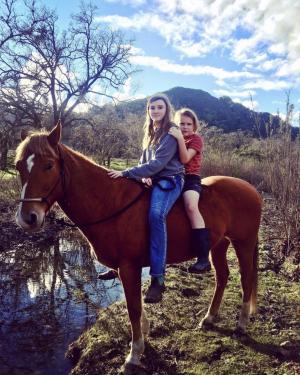 By turning the clock back on decades of overgrazing, synthetics use, and practices that turn a blind eye to everything but humans and cattle, Anwyn and Dan aim to restore the land to its most healthy state and to grow only what serves the land and its inhabitants sustainably. Carbon and healthy soil lie at the heart of every ranch decision.
By turning the clock back on decades of overgrazing, synthetics use, and practices that turn a blind eye to everything but humans and cattle, Anwyn and Dan aim to restore the land to its most healthy state and to grow only what serves the land and its inhabitants sustainably. Carbon and healthy soil lie at the heart of every ranch decision.
“Over time, we’ve woven together a fabric of diverse creatures and systems that serve each other well,” says Anwyn. A herd of Highland cattle act as “fire grazers” in a region known for devastating wildfires, and enrich the land with generous manure. Baby doll sheep graze and fertilize the olive grove without harming the trees. A flock of 70 diverse chickens control pesky insects that follow the grazers, and their beloved dogs protect the livestock from wild predators while allowing the coyotes and mountain lions to coexist nearby. “Last but not least, for purely selfish purposes, our horses serve as a human religion of sorts.”
“The irony is that we’re trying to work with the land in simple ways that all our ancestors mastered thousands of years ago—using old land-management techniques that prioritized stewardship and balance. The most valuable tools we’ve come to use are our powers of observation and our curiosity, traits that were nurtured at Marlboro. Beloved professors like Birje Patel were masters at their craft, but above all else asked fantastic questions and taught that skill to their students.”
But wait, there’s more! For this final issue we decided to assemble a larger collection of alumni profiles, to show the profound range of positive impacts they have had through the years and give concrete examples of Marlboro College’s lasting legacy in the world. Some of them you may have seen before, and some are adapted from other materials, but prepare to by impressed by these leaders in the arts, sciences, humanities, and of course writing:
Class notes are listed by year and include both graduates and nongraduates; the latter are listed under the class with which they are associated.
’51
“Marlboro has a will always be part of me,” writes Bob Hickey. “I will sorely miss Potash Hill since it was one of the main sources of my continued contact with the college. Those early years did so much to build my self-confidence and my future development. Both have stayed with me these 69 year since I graduated. I have corresponded with several of my classmates over the years, but most are no longer with us. I have no idea of how many of the original pioneers are still active. I’m sure the Marlboro legacy will live on.”
’67
“For years I kept a firewall between my work and poetry, writing very few poems about my work experience,” writes Tom Mayo. “Suddenly about two years ago, it all changed for no apparent reason: Notes to the Mental Hospital Timekeeper, published in 2019, is the result. I don’t know whether it’s the beginning of some change in my artistic life or just some passing thoughts I’ve tried to make into hopefully meaningful poems.” According to Amazon, “the poems in Notes to the Mental Hospital Timekeeper demonstrate the humanity of those who suffer from mental illness and the sometimes existential difficulties of caring for the mentally ill. Based on nine years of experience teaching disturbed children and caring for adults whose afflictions range from depression, anxiety, and addiction to deep psychosis, Mayo recognizes the importance of their dignity and shows that compassion, trust and empathy—not fear—are the necessary ingredients to healing.” Find it at on Amazon.
In April, Arthur Magida participated in an online reading and discussion about his new book, Code Name Madeleine: A Sufi Spy in Nazi-Occupied Paris, part of the alumni speaker series. See his presentation.
’70
Dan Preniszni writes, “With apologies to Dickens . . . ‘It was the best of times, it was the worst of times, it was the age of wisdom, it was the age of foolishness, it was the epoch of belief, it was the epoch of incredulity, it was the season of light, it was the season of darkness, it was the spring of hope, it was the winter of despair.’ It was Marlboro.”
’72
Bruce Balmer writes, “Hi everyone. Lisa and I live in my home stompings of Woodstock, New York, finally in a wonderfully serviceable house, with her son Lee, all splitting rent. We prepare for our next Markley&Balmer album in sequestrian circumstances. I made that word up, it’s real. We’ve been performing online concerts for 10 weeks now, allowing us some income, keeping our sanity relatively close at hand. We practice, we write, we walk, we wash our hands. M&B Show: Thursdays 8:30PM EDT from Facebook Live. Grandpa Bruce Show: Sunday 11AM EDT. Stay well, stay safe, stay in touch.”
’73
Michelle Chasse Holzapfel recently posted a digital archive of her amazing works in wood. You can see them all at michelleholzapfel.omeka.net.
’75
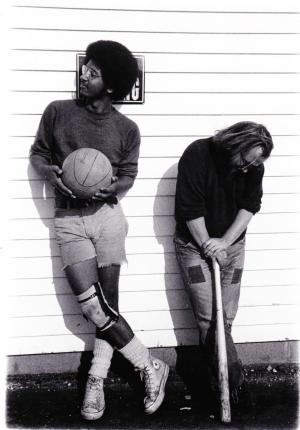
“My wife Helena and I are doing well, under these circumstances,” writes Terry Woods. “We will retire this June. She has taught English at the same high school since 1975, the year she graduated from Douglass, the women’s college of Rutgers, back when there was a women’s college. Her assigned reading before she entered, in 1971, was Sisterhood is Powerful. I will retire after teaching history and English for 40 years. We both despise all this online learning, much more work, far less reward. Not much learning. Marlboro meant the world to me—and still does—and not for the sake of nostalgia. The college was just right for me, in its warm intellectual embrace and its natural beauty. After Marlboro, I earned advanced degrees at Brown and at Middlebury College. As it happens, on e-bay I found a copy of the 1969 – 1970 catalog that drew me to Marlboro.” Terry shares the picture to the right of himself and Lonnie Lamont ’75. “Lonnie and I were very close friends and terrific roommates. He was an amazingly funny, charismatic, athletic fellow, over whom the ladies swooned. Very handsome guy, with a wonderful laugh and a smooth touch.”
Ellen Schön writes, “Hope everyone is well! I had my inaugural exhibition at Boston Sculptors Gallery back in March. Unfortunately, the show was cut short due to Covid-19. Here is a link to a short film I made about the show in lieu of my artist talk.”
’76
Lindsay Beane recently published a memoir “Embracing The Dragon: One Mother’s Relentless Search for Healing and Hope.” The book chronicles her second child’s diagnosis with two life-threatening diseases before the age of one, as well as her exploration of so-called “alternative” healing. Her book is funny, heart-wrenching, and educational about the acupuncture, homeopathy, nutrition, osteopathy, and herbal medicine that she added into her son’s treatment regimen. Her son, now 27 years old, is in great health with an expected normal life expectancy. Learn more at LindsayBeane.com.
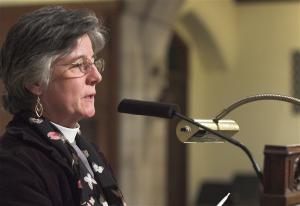
Jan Hamill writes, “44 years ago, Marlboro graduation! Who knew where a Plan in medieval French studies would send me? From Yale Divinity School then to still working at what I love—helping others find sacred
space to connect with self/God, primarily in Christian context. Ordained priest in the Episcopal Church 40 years ago, serving congregations, schools, and now with adults in their 20s in an intentional living/service year context in Episcopal Service Corps. Married to an Episcopal priest, two amazing adult children.”
’78
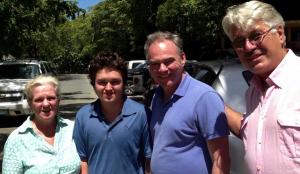
Martha Toomey, who sent this photo taken in 2015 in St. John, writes, “We had no idea our island would soon be a victim of two historic devastating hurricanes. We were forced to evacuate and eventually, with great sadness, sold our home. We moved to Rhinebeck, New York. We are surrounded by Covid but are personally safe. The retirement phrase “fixed income” sounds good to us now. When my dad John Toomey taught at Marlboro, where I lived as a baby, he had no idea what the future held. We have all been forced by circumstances to adjust, persevere. Marlboro College cannot die as long as we keep the values we learned there. Remember that the apple tree always bloomed after the long winter.
’81
In February, Dan Dewalt played his original piano score for the silent film classic Man With a Movie Camera at the Williamsville Hall, a fundraiser for this village meeting place in nearby Newfane.
“Fond memories of Happy Valley on the hill,” writes Evan Stewart. “Numerous friends, 24-hour library (and science building), Grazers’ dome, snow galore, Green Mountains. Cherished times. Also our co-ed bathroom with no shower curtains. Altogether a great educational experience.”
’82
“In July I will complete my sabbatical and return to being the Spiritual Leader and Cantor of the Brattleboro Area Jewish Community,” writes Kate Judd. “I spent seven months in Jerusalem studying Talmud at the Pardes Institute, and (due to COVID-19), two and half more online doing the same from my home in Brattleboro. Pardes is the fifth tiny, creative, quirky, intellectually challenging, institution I’ve studied at in my life, beginning with Marlboro. I am profoundly grieved to see the end of the unique college my grandparents and parents were helped to found and sustain, but Marlboro lives on in all of us!”
Daniel Picker writes, “The Irish Journal of American Studies published my article on ‘European Perspectives on Updike.’ Rain Taxi Review of Books published my fourth review in that journal, this time on John Banville’s Time Pieces. My fiction has recently appeared in The Adelaide Literary Magazine, and my poetry has recently appeared in Plough. I exchange emails with Dan Toomey ’79 and Jim Wade.”
’89
In January, Vaune Trachman wrote, “Next month I have a residency at the Vermont Studio Center, where I’ll be working on a new body of work called “Now Is Always,” which is supported by a 2020 creation grant from the Vermont Arts Council and the National Endowment for the Arts.”
’90
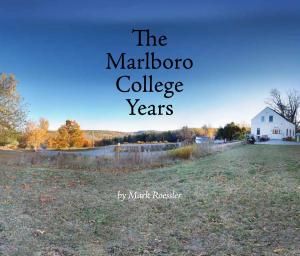 “Initially, I wanted to design a year-book for the final graduating class,” says Mark Roessler in the introduction of his new book, The Marlboro College Years: A Panoramic Celebration (right). “As I discovered the resources available and began sharing my concept, the project’s goals grew and changed. Hoping to reach a wider audience, the book evolved into something more expansive—a pictorial guide, illustrating the campus geography while also giving a sense of chronology. I wanted it to speak to all alumni, but also welcome those who never had a chance to visit in person.” With dozens of panoramic photographs taken at the college from 2019–2020 and many more images from the school’s archives, Mark’s amazing book is now available to everyone at Levellers Press. Learn more and see Mark’s amazing intro video!
“Initially, I wanted to design a year-book for the final graduating class,” says Mark Roessler in the introduction of his new book, The Marlboro College Years: A Panoramic Celebration (right). “As I discovered the resources available and began sharing my concept, the project’s goals grew and changed. Hoping to reach a wider audience, the book evolved into something more expansive—a pictorial guide, illustrating the campus geography while also giving a sense of chronology. I wanted it to speak to all alumni, but also welcome those who never had a chance to visit in person.” With dozens of panoramic photographs taken at the college from 2019–2020 and many more images from the school’s archives, Mark’s amazing book is now available to everyone at Levellers Press. Learn more and see Mark’s amazing intro video!
’91
Judy Houser Baker earned her PhD in English at University of Washington, Seattle, and dedicated her dissertation to Marlboro College. “Very Marlboro!” she says. “It was on ‘translingualism,’ how kids online learn-teach-use language in ways that reveal the deep problems with how we ‘school’ students (and it’s open source!).
’95
Carolyn Ross and Edward Ross ’96 are living in Salem, Massachusetts, with their daughter Avellana Ross ’19, son Finian, and daughter Liadan. Carolyn has worked for 15 years at the Registry of Deeds in Cambridge, while Edward works for the a public health clinic in Lynn. She writes, “We will hold our memories of Marlboro close and carry the learning and friendships that began there into the future. We send our deepest respect to the faculty and staff and students, both current and past.”
’97
“I wrote the first drafts of A Song from Faraway 20 years ago to understand how family identity could be transformed not only by borders and wars but also by various types of artistic expression,” says Deni Ellis Béchard, who published his eighth book in May with Milkweed Editions. “Over the course of many rewrites, the novel’s family took shape, with the lives of its members spanning a hundred and fifty years. Deni participated in an online reading and discussion, part of the alumni speaker series, on May 13. Learn more at milkweed.org/book/a-song-from-faraway.
’98
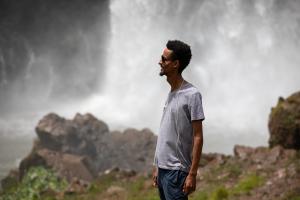
“I just took a leap of faith to bring the Marlboro experience to Ethiopia by planning for a STEAM liberal arts school in Addis Ababa,” writes Dagmawi Iyasu. “It was the best way to celebrate the relocation of Marlboro to Boston as the Marlboro Institute at Emerson College. The dream is already being supported by members of the Marlboro community and hope to welcome the first students in 2025. The new school will be a Center of Excellence for coffee, honey, and dairy as inputs for sustainable living with links to our Marlboro and Vermont heritage. Much love from Addis.”
’03
Jonathan Franklin has spent the last couple of years as part of a team designing a new methane-sensing satellite that will hopefully achieve orbit in 2023. MethaneSAT data will be publicly available and used to drive advocacy to dramatically reduce the emissions of this powerful greenhouse gas from oil and gas operations world-wide. You can learn more at methanesat.org.
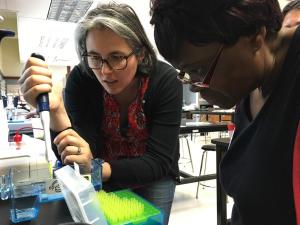
Emily Hood Ferrin is living just outside Chicago with her husband Tim and two kids, Nora (5) and Annie (3). She is the program director and resident scientist for The Baxter Center for Science Education at Northwestern University. Her work is focused on increasing equitable access, exposure, opportunity, and empowerment for K-12 students in STEM. She misses Marlboro dearly and is so thankful for her time on campus with the faculty, staff, and her Marlboro friends.
’05
Sue McClintock is living in Searsport, Maine, and working as the library director at Carver Memorial Library. “It’s hard to believe that it’s been nearly 19 years since I started my career as a freshman with a work-study position at the Rice Library (they broke ground for the Aron wing that spring). This year marked exactly half my lifetime working in libraries.” She sends best wishes to her friends and professors, and says “Marlboro was the first place where I felt like I belonged. I’ve come to appreciate how rare that can be, and how special those connections are.”
’08
Aimee Davidson is living in Providence, Rhode Island, “in good company with many other Marlboro alums. Working in racial justice education and reflecting on my time on the hill, it’s apparent that Marlboro—though unique in many ways—was not free from the US’s legacy of institutional racism, and struggled throughout its history to be an inclusive space for all students. As we reflect on all the wonderful things about Marlboro and its history, we should also be willing to reflect on where our beloved institution fell short, who it failed to serve with equity, and what the consequences of that have been for students and faculty/staff of color through the years. Marlboro College was a treasure no doubt, but I’m sending my hope into the ether that its many alumni will reflect on this aspect of its legacy with some seriousness and humility. Wishing everyone the absolute best.”
’09
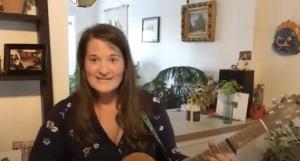 In June, the alumni office presented an online concert with Helen Hummel (right), Tobey Sol LaRoche, woodworker and instrument-builder Jason Breen ’92, Maine-based contemporary folk duo Clayton Clemetson ’19, and Willy Clemetson ’21. Helen recently released a full length album, Many Waters, and has played at the historic Bitter End in New York City, and the legendary Viper Room in Los Angeles.Her music reflects the rural landscape of her upbringing and explores the styles of folk, Americana, and indie, among many others. Toby got his professional start recording and touring alongside fellow Mike Harrist ’10, in an Americana trio called Sol & Kiel, where he solidified an appreciation for creating music that encompasses something beyond itself. Currently based out of Northampton, Massachusetts, Tobey plays percussion and MC’s for a long-standing nine-piece new world funk band, Shokazoba. See the concert again and again.
In June, the alumni office presented an online concert with Helen Hummel (right), Tobey Sol LaRoche, woodworker and instrument-builder Jason Breen ’92, Maine-based contemporary folk duo Clayton Clemetson ’19, and Willy Clemetson ’21. Helen recently released a full length album, Many Waters, and has played at the historic Bitter End in New York City, and the legendary Viper Room in Los Angeles.Her music reflects the rural landscape of her upbringing and explores the styles of folk, Americana, and indie, among many others. Toby got his professional start recording and touring alongside fellow Mike Harrist ’10, in an Americana trio called Sol & Kiel, where he solidified an appreciation for creating music that encompasses something beyond itself. Currently based out of Northampton, Massachusetts, Tobey plays percussion and MC’s for a long-standing nine-piece new world funk band, Shokazoba. See the concert again and again.
’10
Julie Powers writes, “I’m finishing my residency at UMass (where Laura Sturgill ’95 has been one of my faculty), and heading back this summer to the San Francisco Bay Area to start my first job as a family physician. Despite being in residency, I won my category (just intermediate!) in Scottish harp at the Highland Games last fall, and traveled to a trad festival in Ireland with my dance group the summer prior.”
’11
“I finished my Masters in Social Work program last July,” writes Emily Field Uribe. “I am living in Roanoke, Virginia, working as a medical case manager for people living with HIV (the epidemiology of HIV was a small part of my Plan at Marlboro) and as a therapist at a small mental wellness office specializing in social justice and work with underserved minorities. Both jobs have shifted to phone and internet during the pandemic. My Plan at Marlboro was in creative writing, and the observation and empathy skills needed for therapy mirror those that I use in writing. I carry the memory of Marlboro as a small secret strength in my heart.”
Morgan Broadfoot and Daniel Garcia-Galili ’07, MAT ’16 are still happily living at the Putney School, where Daniel teaches math, science, snowboarding, and learning to navigate being human. Daniel recently learned how to fell trees and is currently trying to figure out how to teach progressive and experiential education through a screen—which he will do until the students are able to come back to campus. He also runs the study abroad program (if that ever happens again). Morgan started her first year of medical practice just as Covid-19 started to directly affect the US. She’s a physician assistant at Home Farm Family Medicine, a primary care clinic in Brattleboro that focuses on serving marginalized people, including those struggling with opioid use disorder and those experiencing homelessness. She misses unrationed hand sanitizer and recently learned how to sew garments that don’t look half bad. Both hope to continue to be involved in the Marlboro College community, even without Potash Hill.
’15
Aidan Keeva writes, “Last year, I completed a dual masters and doctorate in Acupuncture and Chinese Medicine in Asheville, North Carolina. Since finishing school, I have been practicing in Michigan and have been traveling extensively (prior to covid) to continue my studies in the Daoist arts. I am currently working on a number of writing projects regarding Chinese medicine and medical paradigms of embodiment more generally, and I teach classes on Chinese medicine and lifestyle in my community and online.”
’17
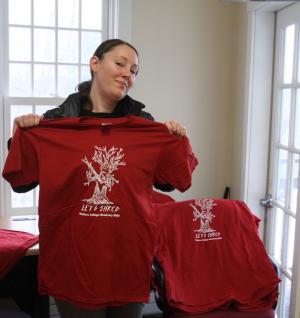
“I’ve worked at Marlboro since 2017,” writes Krystal Graybeal, assistant director of admissions. Right now I’m helping close our beloved library. My alumnus partner and I will spend a slow summer saying a long goodbye to Marlboro from just down the road at the Whetstone Inn. I’ll preserve a little food, walk Mochi on town trail, and complete my MBA on trauma informed leadership (not at Marlboro, unfortunately). In the midst of both a global pandemic and racial justice crisis, I will also be working to unlearn / dismantle white supremacy and seeking ways to show up for my community. I hope to see you out there, too.”
’18
Fiona Craig writes, “I am living a life of love in North Carolina, and starting law school in the fall at UNC Chapel Hill to pursue my dream of being a public defender and advocate for prison abolition. I pray the skunks and bears stay healthy and happy on Potash Hill.”
“I’m currently in Albany,” writes Hannah Noblewolf. “I just received my MA in linguistic anthropology, doing an analysis of the #ShoutYourAbortion movement and abortion stigma. I will be continuing on to Phase II of the doctoral program at SUNY Albany in the fall, hopefully continuing to expand on the work I did for my Plan of Concentration. During the year I TA for introductory anthropology courses, and I really love my program and where I’m at right now.”
’19
“I just finished a wild year staffing a gap year program in Colorado with High Desert Center,” writes Clayton Clemetson. “I found it challenging but rewarding to support a community during the pandemic. I am now holed up in Maine during my two week quarantine, and am excited to rejoin my family soon. I am relieved to have a break from an over-scheduled life although I’m disappointed that my tour with Northern Harmony is canceled this fall. It feels like a good time to look inward and give space to things that I am tempted to ignore, like emotions, and to put energy towards people and projects that matter to me.”
Retired Faculty
“This is a time when people could demand from their states: you need to fulfill your first obligation, which is to protect us,” said retired politics professor Meg Mott, referring to the recent coronavirus pandemic. In an article in The Commons, Meg explains how the public health crisis presents an opportunity for states to have a stronger voice in health care. Learn more.
Mni Wiconi, Water Is Life, retired photographer professor John Willis’s new book on the Dakota Access Pipeline Resistance Movement, was nominated for an Advocacy Award in the Annual Reading the West Book Awards. “This book is still timely in purpose as the government and fossil fuel industry want to move along with the Keystone XL Pipeline and many others. Also, as the Trump administration has recently removed status of the Mashpee Wampanoag Tribe of Massachusetts, ironically the first tribe believed to greet Europeans coming to America. The indigenous people continue to be disenfranchised to help other people’s economic gain.” Learn more at jwillis.net.
